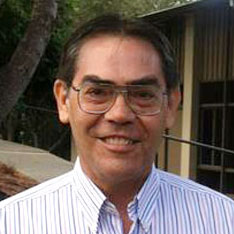Persistence in Prayer

Luke 11: 1-13
[Jesus] was praying in a certain place, and after he had finished, one of his disciples said to him, “Lord, teach us to pray, as John taught his disciples.” He said to them, “When you pray, say: Father, hallowed be your name. Your kingdom come. Give us each day our daily bread. And forgive us our sins, for we ourselves forgive everyone indebted to us. And do not bring us to the time of trial.” And he said to them, “Suppose one of you has a friend, and you go to him at midnight and say to him, ‘Friend, lend me three loaves of bread; for a friend of mine has arrived, and I have nothing to set before him.’ And he answers from within, ‘Do not bother me; the door has already been locked, and my children are with me in bed; I cannot get up and give you anything.’ I tell you, even though he will not get up and give him anything because he is his friend, at least because of his persistence he will get up and give him whatever he needs. So I say to you. Ask, and it will be given you; search, and you will find; knock, and the door will be opened for you. For everyone who asks receives, and everyone who searches finds, and for everyone who knocks, the door will be opened. Is there anyone among you who, if your child asks for a fish, will give a snake instead of a fish? Or if the child asks for an egg, will give a scorpion? If you then, who are evil, know how to give good gifts to your children, how much more will the heavenly Father give the Holy Spirit to those who ask him!”Persistence in Prayer
The role and purpose of prayer in the Christian life has not been emphasized as much as it should be in our Lutheran tradition. It’s not that Luther didn’t speak or write about it. One time he said, “I was so busy today I had to pray for three hours,”– the point being that prayer is so important for us that having a busy schedule is no excuse to neglect it. This would be like a person whose car ran out of gas saying, “I was so busy driving to different places that I didn’t have time to stop at the gas station.” I don’t think anyone would have much sympathy for this person, but yet, don’t we do the same thing? We’re so busy with the often-trivial tasks of everyday life that we don’t have time to make room for God. So if that’s the case, and if over time the stress of living a task-oriented life starts to wear on our morale, our sense of well being, and our ability to give of ourselves in service to others, why should we be surprised? No one is an unending well of energy, and therefore available at all times to devote time and effort to the tasks of life. This reminds me once again of the story in Genesis 3, the one where the first couple was tempted by the notion that “You can be like God.” While there are times when we may think we can be like God who alone is an unending source of creative energy, we are not. As our bodies need to be fed and cared for, so too does our heart and soul. It’s possible to run dry, to burn out, and to feel like an empty well. And if and when this starts to happen; that is the time when we will be tempted to turn to a false god for comfort and consolation—something that will give immediate and temporary relief from the sense that we don’t have anything left to give.
Part of the problem here is that we haven’t been fully informed about the role and purpose of prayer. In the wake of tragedy or illness, we often hear, “Keep these folks in your prayers.” What is meant here is “intercessory” prayer. That happens when we pray for others who are going through a hard time of some sort. These prayers are very important. It can be a great comfort to know you are being prayed for. It makes us feel as if we are in some sense in the hands of God. When we are in grief, in ill health or when something very bad has happened as it has so many times in our country and world recently, it helps to feel like the problem has been given over to God to deal with. This is what we do in intercessory prayer. But what about finding a source of life, strength, inspiration, joy, and love on an ongoing basis? How do we find the spiritual nourishment we need to stay on a path that gives life and hope instead of weakness and despair?
As Lutherans, we might say that this nourishment comes to us on Sunday mornings when we hear the Gospel proclaimed and when we receive the sacrament—well, on the Sundays when we’re present. And that would be a good answer. It does, and as long as you are hearing the Gospel, and as long as the sacrament is rightly administered, you will find spiritual nourishment in that. But what about the other 167 hours of the week? Are we then on our own? Or is there another way to find and connect with God so that we are not so busy and distracted that we end up like the guy who ran out of gas on the bridge because he neglected to go to the gas station? Or, another way to think of this: we’re often like the person who booked a cruise but didn’t know the meals were included in the price. During the whole journey, he ate some meager fare he had brought along while neglecting the huge smorgasbord available in the dining room 24 hours a day. There was no need to go hungry or to end up feeling like an empty shell when food and nourishment were available in abundance.
This passage from Luke is very instructive in this regard. And it speaks of another kind of prayer, not just the prayers that communicate to God what we want, but also the prayers that are open to receive what God desires to provide for us. We might call this the prayer of an open heart for God’s presence and grace.
Last week, we talked a little bit about what Jesus was sent to give us in connection with the story of Mary who sat at his feet and with an open heart and received what he had to give. Many people, especially people who don’t know much about the Christian faith, think of Jesus as primarily another teacher or rabbi with a warm and fuzzy message about love. Actually, this is something of a misrepresentation of who he was. He did teach people about God’s love. But his mission was not just to teach about it—it was to give God’s love to anyone who had an open heart to receive it. We call that faith. Paul said, “In him all the fullness of God was pleased to dwell.” Paul’s intent here is to convey the fact that, when we receive him, we receive God. This is how God makes himself available to us. He comes to us in a way we can see and recognize—as a human person like us. Jesus came to give us God. He poured out his life so that we could receive God’s presence and love into our lives.
But what does that mean and how do we receive what Jesus came to give? We already mentioned the word and sacrament as means whereby we can receive the presence of God’s love. What Jesus is talking about here is a third way—the way of prayer.
The presence of God is known by what it gives us. John was very specific about this when he said, “God is love.” God gives us divine love. Receiving the presence of God is the same thing as receiving God’s love because his being is love. And God’s love transforms and renews our conscience. Under the law, our conscience tells us that we’re unworthy and sinful creatures that deserve nothing but judgment. God’s love, when received by faith, takes that away. It literally removes the feelings that we are bad, guilty, and shameful. And by so doing, it gives us innocence, righteousness, and a clean heart. We can’t create this for ourselves. God does it for us.
The presence of God in our hearts and minds gives us life. We know we are vulnerable to threats of all kinds, sickness, violence, accidents, disasters of all kinds, not to mention ageing. And we know—at least when we choose to be aware of it—that our lives can be snatched away at any time. This causes fear, anxieties, and it can lead to hopelessness. God’s presence provides us with a source of life that these threats cannot take away. It is a source of life unavailable to—as Jesus put it, “rust, moth, and thieves.” God’s presence gives us eternal life because that’s what God is—eternally living.
God’s presence in our hearts and minds saves us from despair and gives us hope—hope that springs eternal. Despair is the result of having suffered the loss of that to which we were so attached that we feel as if we have lost our very heart. Or, it can be the result of having pursued life and meaning in things that didn’t deliver and so we feel as if there is nothing left to believe in. This is a common mistake among those who pursue a purely secular point of view. They don’t think they have faith. They have facts. This is laughable. They have replaced faith in God with faith in facts—or rather, what they believe to be facts. But here’s the thing. Facts, and whatever abstract world-view these things are based on, don’t give you hope for a future filled with goodness and life overflowing. Only the Spirit of God can do that. And so, faith, hope, and love—these are only some of the gifts that God’s presence in our lives inspires in us.
Prayer has everything to do with this. God is always present with us. These gifts are always available to us. In prayer, we come into the presence of God with open hearts, ready to receive what God has to give us. Words in this kind of prayer are entirely unnecessary. God already know what we need. He knows we need the gift of his Spirit to be made whole and well. However, this is not always so easy because our hearts and minds are already filled with other desires, needs, concerns, and worries. It can be a very difficult challenge at times to open ourselves up to God’s presence. This is why Jesus teaches his disciples here to be persistent. Don’t give up. Return to the Lord again, and again, and again.
This is also why he goes on to ensure them that everyone who seeks will find. Everyone who asks will be answered. Everyone who knocks, the door will be opened. Never come to the conclusion that God has abandoned you due to your own impatience, or because the allure and promise of some immediate source of comfort is too difficult to resist. This is why he includes in his model prayer, “Save us from the time of trial.” Keep knocking, keep asking, keep seeking, keep showing the discipline and persistence we know we need for anything worthwhile. Show this and more as you seek the “pearl” of greatest value. God’s love is not a reward for our persistence and spiritual discipline. It’s our way of being serious about that which is of the greatest value in our lives. We reap what we sow. This is another way of saying we get what we believe in, or as Jesus put it, “Wherever your heart is, there is your treasure as well.”
Prayer is another way of giving our heart to that which we treasure most. And Jesus concludes his teaching on prayer by telling us how it is that the presence of God enters our hearts and minds. And, as usual, he uses a metaphor. When we, who otherwise tend to seek only that which is in our self-interest, are asked for good gifts by our children, we give them good gifts. We not only know how to do that. We desire to do that. If that’s the case, when we ask God for what we need, how much more will he do that? And what is that good gift that God desires to give us? How much more will the heavenly Father give the Holy Spirit to those who ask him?”
The presence of God in our hearts and minds, that by which we receive the gifts of faith, hope and love, is the Holy Spirit. God’s Spirit is available to us always. That spirit of life and love comes to us in word and sacrament and comes to us when we open our hearts in prayer at any time. Therefore, ask seek, knock—and be persistent in doing so. After all, we are willing to give time and energy to things that are of only temporary value. How much time and energy is worth devoting to that which is of eternal value?
To have faith in God means entrusting him with our hearts. This is not a flash in a pan. It’s a journey—a lifetime journey. And one of the most important—no, essential—aspects of that journey is to look to God’s presence each day of our lives. And we do so, not in fear or in worry that he may not answer. Rather we do so in confidence, knowing that he desires to give us the gift of himself whenever we ask.
Recent Sermons

The Assurance of Jesus’ Presence
April 21, 2024

Made Strong By Faith
April 14, 2024

Jesus Appears
April 07, 2024



